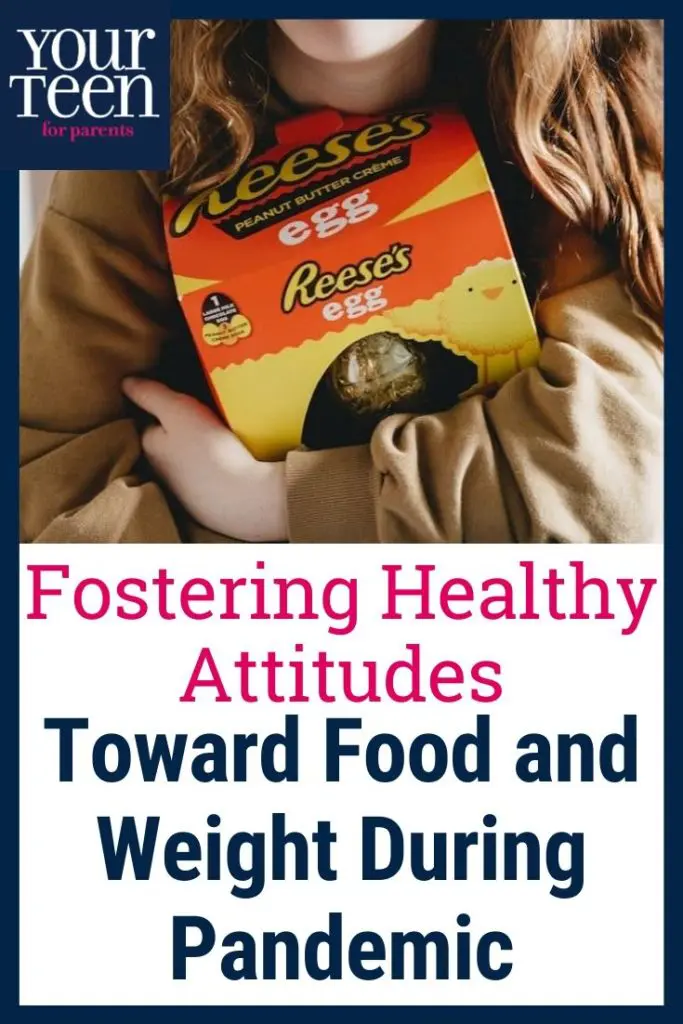The COVID-19 pandemic is having innumerable and profound consequences, including effects on our mental health. Intense uncertainty, isolation from friends, lack of routine, and lack of control can all negatively impact psychological well-being, particularly for teens.
| [adrotate banner=”169″] |
“There’s not much our kids have control over,” says Suzanne Mazzeo, PhD, a professor of psychology at Virginia Commonwealth University and Editor-in-Chief of Eating Behaviors. “Everything is being ripped out from under them.”
The pandemic contributes to anxiety, which, Mazzeo explains, often goes hand-in-hand with an eating disorder. Along with increased anxiety, perceived food scarcity, food stockpiling, and persistent messages about the fear of gaining weight while staying home can potentially trigger unhealthy behaviors.
7 Ways Parents Can Foster Positive Behaviors and Attitudes toward Food:
1. Educate yourself on the triggers for and signs of an eating disorder.
This can be particularly important because eating disorders can be so difficult to spot early on. Often, eating disorders start with a seemingly innocuous desire to lose weight. As a teen, my own struggle with anorexia began when I decided I wanted to be as fit and toned as possible. It didn’t take long for me to slip into a period of severe restriction and compulsive exercise.
2. Pay attention to your kids’ habits and behavior.
Movement and exercise have psychological benefits, so it can be helpful for kids to go for a walk or a run. Mazzeo’s own teen daughter enjoys the team-building aspects of her sport by working out virtually with friends.
It’s important to ensure, however, that your teen is not exercising excessively. If that does happen, Mazzeo suggests telling them, “I know it might feel like that’s a good thing to do right now, but part of being healthy is not wearing your body down by over-exercising.”
3. Help your teen develop a routine.
For many people, eating disorders develop because of a desire to exert control over situations that can feel scary and overwhelming. “No one has control over much right now, so that’s really stressful,” says Mazzeo. “What we’re recommending for everyone is to have a routine and keep as much structure as you can.”
4. Enjoy structured mealtimes.
Mealtimes can provide an ideal opportunity for relaxed conversation and connection and encourage healthy attitudes towards food. For many of us, family meals are easier to achieve now than ever before. After all, we aren’t driving all over town to practices and events. “If there’s any small silver lining to social distancing, it’s that we have the opportunity to have family meals,” says Mazzeo.
5. Encourage connection.
Eating disorders can thrive in isolation, so it’s important to encourage teens to maintain connection with their friends. “In some ways this pandemic is hardest on teens,” says Mazzeo. “Their developmental process is to develop independence from their families, and they’re stuck at home all day every day.”
This may be one time we are thankful for technology. My kids can have conversations with their friends, teachers, and extended family, and those connections are incredibly beneficial to their mental health. They’re keenly aware of the benefits of in-person over screen-to-screen interaction, but some connection is better than nothing.
6. Model healthy approaches to food and exercise.
Our kids always learn from us, and they are likely watching us now even more than normal. For the past several weeks, I have been trying to lead by example by moving my body as a form of self-care and emotional wellbeing. I’m enjoying going for walks with my family and playing sports with my kids. I’m participating in live-streamed Zumba classes when I can because they bring me joy and help me stay connected to a community I’ve grown to love.
I am also trying to eat well, which means I’m eating a variety of foods. There is a place in every diet for treats. There are times when I’m feeling bummed about the many things we can’t do and want to enjoy an indulgence. I am not relying on food as a primary means of coping with stress, but I can derive pleasure from tasty treats.
It has become routine for people to joke about gaining weight during the quarantine. We are stressed, bored, and surrounded by stockpiled snack foods. For people with eating disorders or who are predisposed to developing an eating disorder, those kinds of comments can be triggering. I find them triggering, and I have been in recovery for decades. Some people will respond to that sentiment by restricting and exercising compulsively. It’s best to avoid making comments about weight gain and dieting, and be aware if your teen seems overly preoccupied with weight gain.
7. Model effective coping strategies for dealing with uncertainty.
We’re all currently tasked with finding ways to manage our anxiety and other negative emotions. “It’s important to center and ground yourself, and it’s important to model giving yourself grace,” says Mazzeo. “We’re not going to do everything perfectly all the time.”

I am working to stay healthy emotionally and physically during a stressful time—and I’m hoping to help my kids do the same.





